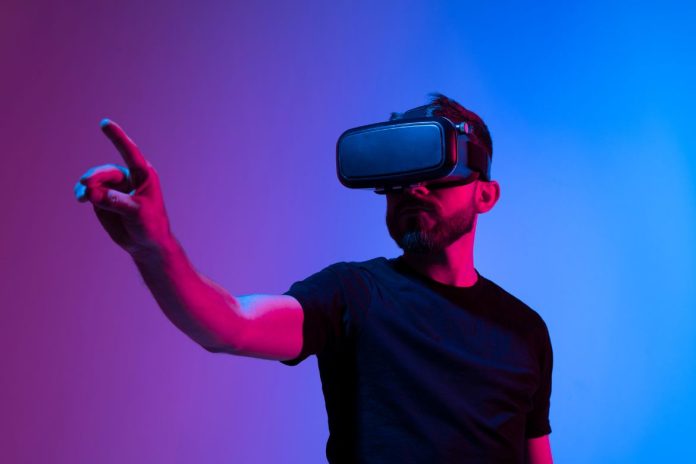In the last decade, we have witnessed a radical transformation in how we interact with technology, where virtual worlds and augmented reality have merged to create a comprehensive digital experience known as the “Metaverse.” The Metaverse, or the interactive virtual world, is no longer a mere fantasy from science fiction novels but a developing reality expected to play a pivotal role in shaping our future.
What is the Metaverse?
The Metaverse is an immersive digital environment that combines multiple technologies such as Virtual Reality (VR), Augmented Reality (AR), and Artificial Intelligence (AI) to provide interactive experiences that blend the real and virtual worlds. Within the Metaverse, users can move freely, communicate, collaborate, and work in limitless environments, enabling them to perform tasks and activities that are impossible in the physical world.
Key Technologies Shaping the Metaverse
Creating a future interactive Metaverse requires the integration of several advanced technologies that seamlessly work together to offer exceptional experiences. Among these technologies are:
- Virtual Reality and Augmented Reality: VR and AR are the foundation upon which Metaverse environments are built. Through VR devices like headsets and wearable gadgets, users can immerse themselves in customized virtual worlds. AR enhances this experience by adding virtual elements to the real world.
- Artificial Intelligence: AI plays a crucial role in improving the Metaverse experience. With AI, intelligent virtual characters can interact with users dynamically and naturally. AI also helps enhance the quality of the experience by learning user behaviors and tailoring content accordingly.
- Blockchain Technology: Security and credibility are vital components of the Metaverse. Blockchain technology provides a decentralized system to record and verify transactions and digital ownership within the virtual world. This enhances trust among users and enables them to own and trade digital assets.
Real-Life Examples of Metaverse Applications
The Metaverse is not just a future concept; it is already being used today in various fields in innovative ways, and its impact is expected to expand in the future. Here are some real-life examples:
- Virtual Education in Global Institutions: Stanford University in the United States has already begun experimenting with virtual education through the “Stanford Virtual Human Interaction Lab,” where students can attend classes in 3D virtual environments. This allows them to interact with educational content in a new and immersive way, exploring historical sites or engaging in scientific simulations in fields like medicine or engineering.
- Professional Training in the Metaverse: Companies like Siemens have started using Metaverse technologies to train employees on complex operations through virtual environments that simulate factories and facilities. New workers can acquire the necessary skills without the need to use expensive or high-risk equipment.
- Remote Work and Collaboration: In 2021, Meta (formerly Facebook) announced the launch of “Horizon Workrooms,” a Metaverse-based platform for remote work where employees from around the world can meet in interactive virtual offices. This enhances collaboration and productivity as employees can brainstorm, hold meetings, and work on joint projects as if they were in the same room, despite being physically apart.
- Virtual Entertainment and Music: Virtual concerts are becoming increasingly popular in the Metaverse. One notable example is the “Travis Scott” concert held within the game “Fortnite” in 2020. This event attracted more than 12 million players worldwide who attended the concert virtually and interacted with a unique and immersive entertainment experience.
- Shopping in the Metaverse: Some major brands like “Gucci” have already begun exploring shopping opportunities in the Metaverse. For instance, “Gucci Garden” was launched on the “Roblox” platform, where users can explore products and purchase virtual items inside an innovative shopping experience.
Challenges Facing Metaverse Development
Despite the immense potential that the Metaverse offers, it is not without its challenges. Some of these challenges include:
- Technical Infrastructure: The Metaverse requires an ultra-fast communication network and massive data processing capabilities to support immersive experiences. These requirements are not available in all parts of the world, creating a digital divide.
- Privacy and Security: With millions of users in a single virtual world, privacy and security become even more critical. How can personal data be protected in a complex and interconnected environment like the Metaverse?
- Digital Addiction: While the Metaverse offers immense opportunities, excessive use may lead to issues related to digital addiction and social isolation.
Conclusion
The Metaverse seems to play a significant role in shaping our future, offering countless opportunities. However, despite the potential, the success of this technology requires addressing many technical and ethical challenges. The future is promising, and the Metaverse could be the gateway through which we transition to a more advanced and integrated interactive world.
Written by: Ahmed Fathi Mohamed








